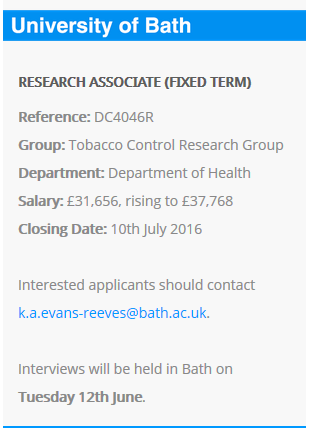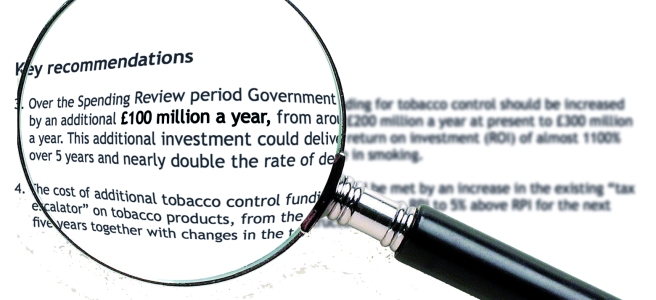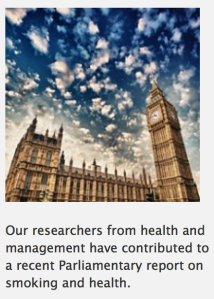 Big Tobacco’s dirty tricks in opposing plain packaging – Dr Jenny Hatchard
Big Tobacco’s dirty tricks in opposing plain packaging – Dr Jenny Hatchard
Originally posted: October 17, 2016 1.38pm BST
Tobacco companies want to sell you cigarettes – today, tomorrow and for the foreseeable future. Whether you’re at the tobacco counter or out with friends, glitzy cigarette packaging is a really important part of their sales pitch. Tobacco companies are aware of this. It’s why they are so opposed to their cigarettes being put in plain packaging.
But it isn’t just tobacco companies that are against plain packaging. In the UK, where plain packaging was introduced in 2016, business associations, think tanks and civil society groups publicly campaigned against the policy and academics, research consultants and public relations and law firms variously wrote lengthy reports and lobbied the government.
But why would these organisations lobby against plain packaging? On looking into these opposition groups, our recent research gives a clear answer. Opponents of plain packaging tend to have links to the tobacco industry. So much so that three-quarters of organisations identified in our study had financial links to tobacco companies.
Perhaps we shouldn’t be surprised. Decades of research into political activity by the tobacco industry has shown that “third parties” are used to campaign against tobacco-control policies. Health advocates are aware of this. In 2005, the World Health Organisation’s Framework Convention on Tobacco Control committed the countries that signed the convention to protect tobacco policy from interference by the tobacco industry and, crucially, groups linked to them. In response, in 2011, the UK government committed to publishing details of any policy meetings with tobacco companies and the Department of Health routinely requests disclosure of tobacco industry links. So far so good. In doing so, the UK sets a strong example.
Third party interference
But our research shows how “third party” opposition to tobacco control policies extends tobacco industry interference beyond this realm of government. In a three-year period which included the 2012 government consultation on plain packaging, 88% of research and 78% of public communications opposing plain packaging were carried out by organisations with financial links to tobacco companies (see figure 1). And public and retailer campaigns funded by tobacco companies to mobilise opposition to plain packaging generated 98% of the more than 420,000 negative postcard and petition submissions to the consultation.

In this way, ideas and arguments that come from tobacco companies and their research spill into public spaces. Once there, they can influence the public and political mood on life-saving tobacco control policies and create a misleading impression of diverse and widespread opposition. This is known in the world of political science as “conflict expansion”. And the potential effects are significant. When widespread, these “third party” activities can work to delay and even prevent policies: it took four years to get from consultation to implementation in the UK.
This wouldn’t be so serious if organisations and tobacco companies were open about their relationships. But, in many cases, links were not easy for the research team to detect. Of 150 examples of public communications, less than 20% explicitly acknowledged tobacco industry connections. And, while academics and research consultants tended to clearly report funding sources, “third parties” promoting their research in press releases, news stories and letters to government, frequently did not.
If they were open about their financial relationships with tobacco firms, business and civil society organisations would give the public, politicians and officials the opportunity to scrutinise their arguments and evidence in context. In the case of plain packaging, a lack of openness masked these links and lent credibility to claims that the policy lacked evidence and would increase the trade in illicit cigarettes – claims which have been shown to be unfounded by both peer-reviewed research and by the High Court in Britain. Now, as more countries move to introduce plain packaging, “third party” transparency remains an issue.
In order to help countries guard against tobacco industry interference, awareness can be raised of the effects of their activities on public and political debates. And steps could be taken to make their relationships with tobacco companies clearer. A compulsory register of tobacco companies’ memberships, political activities and associated spending would be a strong first move.
There is strong global commitment to addressing the problem of tobacco industry interference. Parties to the framework convention meet in India in November amid concerns about this issue, and the message to the tobacco industry from the WHO is clear: “The world understands who you are and what you do, and is determined to stamp out the global plague which you do so much to spread.”





